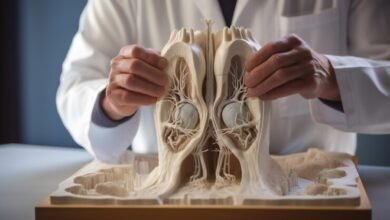The Future of Alzheimer’s and Dementia

The future of Alzheimer’s and dementia is a topic of paramount importance as we confront the challenges posed by an aging global population. This article explores the latest developments in understanding, diagnosing, and caring for individuals with Alzheimer’s and dementia. It also delves into the evolving landscape of pharmaceutical and non-pharmacological interventions, advancements in technology, and the emergence of dementia-focused communities.
Understanding Alzheimer’s and Dementia
Alzheimer’s disease and dementia are complex neurological conditions characterized by cognitive decline and memory loss. Dementia encompasses a range of disorders, with Alzheimer’s being the most common. Understanding these conditions is vital for effective management and treatment.
The Global Alzheimer’s Epidemic
In the 21st century, the world is grappling with an unprecedented healthcare challenge—the global Alzheimer’s epidemic. Alzheimer’s disease, a progressive neurodegenerative condition that primarily affects memory and cognitive functions, has emerged as a significant public health concern. This epidemic is driven by various factors, including an aging population, changing lifestyles, and increased awareness and diagnosis.
A Growing Aging Population
One of the primary drivers of the Alzheimer’s epidemic is the aging global population. As medical advancements have increased life expectancy, a larger portion of the world’s population is living into their senior years. Alzheimer’s and related dementias predominantly affect older adults, with the risk increasing significantly with age. The demographic shift towards older age groups is amplifying the prevalence of the disease.
Changing Lifestyles
Changing lifestyles and urbanization have also contributed to the rise of Alzheimer’s cases. Factors such as sedentary lifestyles, poor dietary choices, and increased stress levels can impact the risk of developing Alzheimer’s. Furthermore, the proliferation of environmental toxins and pollutants in urban areas may have an adverse effect on cognitive health.
Increased Awareness and Diagnosis
Advances in medical research and greater awareness of Alzheimer’s symptoms have led to more accurate and timely diagnoses. In the past, many cases of Alzheimer’s went undiagnosed or were mistakenly attributed to the normal aging process. The increased recognition of Alzheimer’s as a distinct medical condition has led to a surge in reported cases, contributing to the sense of an epidemic.
Read More: The Role of Genetics in Alzheimer’s Disease
Economic and Social Impact
The Alzheimer’s epidemic extends beyond its direct health consequences. It places a significant economic and social burden on affected individuals, families, and healthcare systems. The cost of caring for Alzheimer’s patients is substantial, encompassing medical expenses, caregiving costs, and lost productivity. This strain on healthcare and economic resources is a pressing concern for governments and societies worldwide.
Global Response and Research
Recognizing the scale of the Alzheimer’s epidemic, governments, research institutions, and organizations have initiated efforts to better understand the disease, develop effective treatments, and improve caregiving strategies. Ongoing research into the genetic, environmental, and lifestyle factors associated with Alzheimer’s is shedding light on potential preventive measures.
Genetics and Alzheimer’s
Genetic factors play a crucial role in Alzheimer’s risk. We delve into the genetic components of the disease, exploring how DNA testing can provide valuable insights.
Early Detection and Diagnosis
Early diagnosis is key to managing Alzheimer’s and dementia effectively. We discuss the importance of early detection and the role of cognitive assessments.
Pharmaceutical Advancements
Pharmaceutical research is at the forefront of Alzheimer’s treatment. We review the latest advancements in drug therapies, potential breakthroughs, and their impact on patients’ lives.
Non-Pharmacological Interventions
Non-pharmacological approaches are gaining prominence. We explore lifestyle changes, nutrition, and cognitive training as alternatives to traditional medication.
Caregiving in the Digital Age
In an era of digitalization, caregiving for Alzheimer’s patients has evolved. We discuss the digital tools and resources available to caregivers.
Technological Innovations
Technology is transforming Alzheimer’s care. We look at wearable devices, AI, and telemedicine, all of which contribute to enhancing the quality of life for patients.
Alzheimer’s and Dementia-Friendly Environments
Creating supportive environments is essential for those living with Alzheimer’s and dementia. We investigate architectural changes and design principles for dementia-friendly spaces.
Dementia-Focused Communities
The emergence of dementia-focused communities provides a ray of hope. We explore the concept of such communities and their positive impact on patients and their families.
Ethical and Legal Considerations
As the understanding of Alzheimer’s and dementia deepens, ethical and legal issues arise. We discuss topics like informed consent and decision-making capacity.
The Role of Research and Clinical Trials
Research and clinical trials are at the forefront of the battle against Alzheimer’s disease. These vital components play a pivotal role in understanding the condition, developing effective treatments, and enhancing the lives of individuals living with Alzheimer’s.
Advancing Scientific Understanding
Alzheimer’s is an incredibly complex disease, and researchers are continually working to unlock its secrets. Studies explore the genetic, environmental, and lifestyle factors that contribute to its development. By understanding these elements, researchers hope to discover ways to prevent or slow the progression of the disease.
Developing New Treatments
Research into Alzheimer’s disease is crucial for developing new treatments. Clinical trials test potential drugs, therapies, and interventions designed to alleviate symptoms and modify the course of the disease. These trials provide a platform for evaluating the safety and efficacy of novel treatments.
Enhancing Early Diagnosis
One of the most significant challenges in Alzheimer’s care is early diagnosis. Research is focused on identifying early biomarkers and developing diagnostic tools that can detect the disease before substantial cognitive decline occurs. Early detection is vital for timely intervention and improved patient outcomes.
Investigating Preventive Strategies
Alzheimer’s and Dementia: Prevention is a critical aspect of Alzheimer’s research. Scientists are exploring lifestyle modifications, such as a healthy diet, regular exercise, and cognitive stimulation, as potential preventive strategies. Understanding the modifiable risk factors can empower individuals to make choices that reduce their likelihood of developing the disease.
Personalized Medicine
Alzheimer’s and Dementia: Alzheimer’s research is moving towards a more personalized approach. By studying individual variations in genetics, response to treatment, and lifestyle, researchers aim to tailor interventions to suit each patient’s unique needs. This personalized medicine approach holds great promise in improving the effectiveness of Alzheimer’s care.
Ethical Considerations
Alzheimer’s and Dementia: Research in Alzheimer’s also encompasses ethical considerations. Issues related to informed consent, privacy, and decision-making capacity are explored in-depth. Ethical guidelines are crucial to ensure the well-being and autonomy of individuals participating in clinical trials.
Global Collaboration
Alzheimer’s and Dementia: Collaboration is a fundamental aspect of Alzheimer’s research. Scientists, clinicians, and organizations from around the world work together to share data, insights, and discoveries. This global cooperation accelerates progress and maximizes the potential for breakthroughs.
The Importance of Clinical Trials
Alzheimer’s and Dementia: Clinical trials are the bedrock of Alzheimer’s research. These trials involve rigorous testing of potential treatments, and they offer individuals living with Alzheimer’s the opportunity to access cutting-edge therapies. Participation in clinical trials not only benefits the individual but also contributes to the advancement of Alzheimer’s science.
Holistic Approaches to Alzheimer’s Care
Alzheimer’s and Dementia: Holistic care considers the overall well-being of patients. We explore mindfulness, arts, and therapies as integral components of holistic care.
Read More: Understanding Alzheimer’s and Dementia: A Guide to Cognitive Health
Conclusion
The future of Alzheimer’s and dementia is marked by a challenging yet promising landscape. As the global population continues to age, the prevalence of these neurodegenerative conditions is on the rise. However, we are not passive observers of this growing challenge. Science, research, and innovative approaches are reshaping the way we understand, diagnose, and care for individuals living with Alzheimer’s and dementia.
From advancements in genetics, which shed light on the disease’s roots, to early detection methods that enable timely intervention, we are on the cusp of a new era in Alzheimer’s care. The pharmaceutical industry is exploring groundbreaking treatments, while non-pharmacological interventions, such as lifestyle changes and cognitive training, are gaining momentum.
In the digital age, technology is playing a transformative role in Alzheimer’s care, offering support to caregivers and enhancing the quality of life for patients. Dementia-focused communities and dementia-friendly environments are emerging, creating spaces where those affected can thrive.
As we navigate this landscape, we must also consider ethical and legal dimensions, ensuring the dignity and autonomy of individuals living with Alzheimer’s and dementia.
FAQS
What is the most significant risk factor for Alzheimer’s?
Genetics plays a significant role in Alzheimer’s risk, especially if there’s a family history.
How can I detect Alzheimer’s disease early?
Early detection is possible through cognitive assessments and memory screenings.
Are there any non-pharmacological treatments for Alzheimer’s?
Yes, lifestyle changes, cognitive training, and a balanced diet can be beneficial.
What role does technology play in Alzheimer’s care?
Technology aids in remote monitoring, cognitive exercises, and providing support to caregivers.
How can I create a dementia-friendly environment at home?
Design changes, such as reducing clutter and enhancing safety, can make a significant difference.







